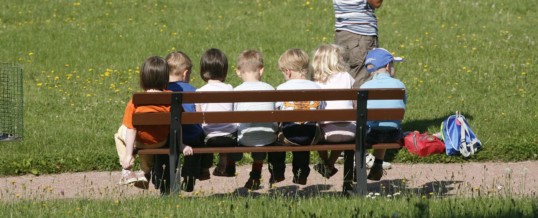
-
A list of things a child needs to learn in preschool
When you begin to look at preschools for your children, it’s easy to be wowed by some of the exciting things many of them will offer to compete for your business, such as big muscle rooms, regular field trips, strenuous academic curricula, and name-brand extracurricular activities taught by outside instructors.
This splendid collection of activities raises a question: How can parents figure out the best pre-school environment for their child?
It helps to think for a minute about who children are at this age and stage; then it becomes much easier to figure out an environment that matches their development level and abilities.
Two- to 5-year-olds are evolving people – not totally developed. Their personalities and sense of the world are still getting organized.
That’s what we mean when we talk about developmental stages: Children are continually organizing and reorganizing as their abilities evolve for moving around in – and understanding – the world. So we are looking for an environment that promotes this process of organization, that encourages children to feel safe in the world, in charge of themselves, and zestful about new experiences and learning.
What this means is that some of the best preschools may be the least exciting to visit. Or more accurately – they won’t be overexciting.
They tend to be quiet places that emphasize a daily routine. That allows children to know what’s going to be happening and to predict their experience. Such an environment helps them to learn about the world and themselves in a way that encourages mastery.
Activities are designed to stimulate, not over-stimulate. At this age children don’t need so much outside stimulation; they need to process experience in little bites rather than bug gulps. Otherwise they get overwhelmed, which gets in the way of their feeling safe and organized inside.
In other words, the purpose of preschool is to help a child become a learner – someone invested in learning, with the skills to be able to learn, and who enjoys mastery and work.
Or still another way: It isn’t a matter of how much a child knows, as gratifying as that might be; It is a matter of how the child learns and how he or she feels about learning. By becoming learners in these early years, children will have the skills they need to succeed in any academic environment in the future.
Here are 19 specific tasks that are prerequisites to becoming a learner. Mastering them requires a gradual process that evolves from the ages of 2½ to 5.
Once mastered, these tasks will allow a child to learn anything when the time is right. But if a child hasn’t succeeded in mastering these tasks by early elementary school (more or less), he or she will be compromised in learning, which can interfere with their future educational investment and success.
Mastery Tasks for Becoming a Learner
Listed below are 19 specific tasks children need to master in order to become learners. A strong preschool curriculum is organized to help children attain these skills:
- Be able to take care of the self – their bodies and their things – in an appropriate way.
- Be able to separate from their parents/caregivers in such a way that they maintain energy, zest, interest and spectrum of affect in the new environment.
- Be able to see the teacher as a teacher, not just a substitute caregiver. Be able to trust so they can later learn from different people.
- Be able to use language for communication; be able to ask questions.
- Be able to listen and hear communications; be able to hear answers to questions.
- Be able to take in and express (a corollary to No. 5).
- Be able to sit still and be in their own space.
- Be able to delay gratification (i.e. wait).
- Be able to tolerate frustration; try, try again!
- Be able to relate to peers as people, rather than as conveniences or inconveniences.
- Be able to function in a group while maintaining autonomy and without feeling lost.
- Be able to make transitions.
- Be able to follow directions.
- Be able to risk.
- Be able to be wrong.
- Be able to have pleasure in learning and mastery.
- Be able to be curious in a neutral and productive way.
- Be able to assert themselves in socially acceptable ways.
- Be able to remain neutral in the classroom – that is, be a schoolboy or schoolgirl.
As adults and parents – because we can’t remember routine events from our own toddler years – it’s easy to forget that these skills are neither intuitive nor self-learned. They need to be taught and reinforced through patience, understanding, kindness and quiet dedication.
When evaluating preschools, this is what I recommend parents seek.
Explore our kindergarten and preschool programs. For younger children, our parent/toddler program provides developmentally minded fun.
MAR
2024


About the Author:
Deborah Paris, LISW, is a Hanna Perkins-trained child psychoanalyst who works with children, families and adults.